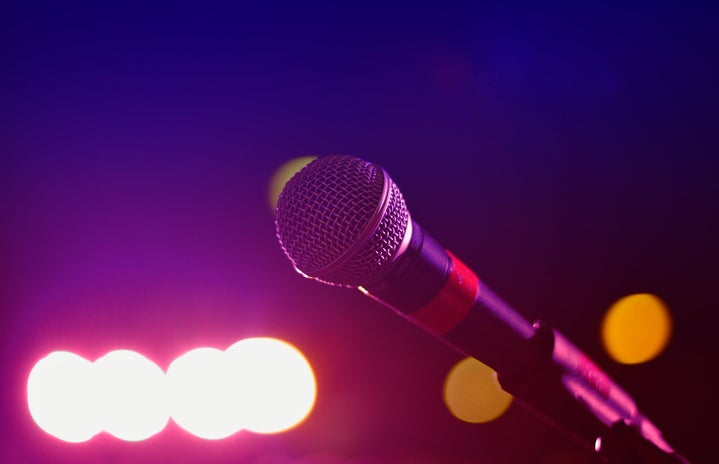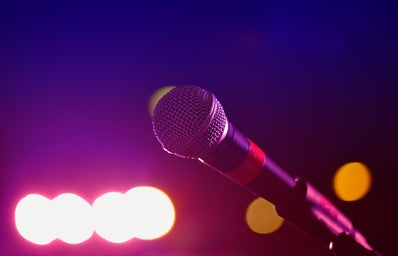A typical Friday night at TCNJ usually doesn’t mean congregating at the Rec Center, participating in dance parties and rapping along to talented artists. But last Friday, this year’s spring concert featured Mac Miller, Big Sean and GrooveBoston, the DJs responsible for the psychedelic visual effects, remixed beats and “legendary” dance parties. Her Campus TCNJ was lucky to sit down with Mac Miller and GrooveBoston’s Bobby Dutton and Adam Weisman to find out more about their musical careers.
Your name is Malcolm McCormick, and your brother’s name is Miller. How did you form the name “Mac Miller” for your stage name?
Mac Miller: I used to go by the name “Easy Mac” when I was 15, but it wasn’t serious enough. At first, me rapping was something we liked. We liked the cheesy name, no pun intended, then I could actually rap. When I was 17, me and Q [Quentin] just decided to change it. Miller is also a family name. It’s not only my brother’s name; it’s the last name of my great grandparents. For me, there’s no meaning. I just thought it sounded cool. It sounds like a clothing designer, like sheepskin boots by Mac Miller.
How was it collaborating with Ariana Grande and shooting the video for her new single, “The Way?”
MM: She’s really talented, and she can really sing. My thing is that she’s a really nice person, and she can sing her a– off. As a friend of hers, I don’t want her to get pigeonholed into this “little kid” thing. I’ve been doing a lot of work with her. We have other records that we’ve done for her album. The video was fun, and it ended up going well.
Do you like hearing it on the radio?
MM: I’ve actually never heard it. I never really listen to the radio. When I’m in the car, I always have the auxiliary wire in my iPod. If it was back in the day, we’d all be sitting around the radio and the fireplace. But I never hear myself on the radio. I miss everything.
On MTV2’s “Mac Miller and the Most Dope Family,” what is it like being with your best friends all the time?
MM: It’s awesome. The greatest part about it was when we first started doing the show, they were like, “You’re all best friends. We’re sure we’re going to catch all the bickering and fighting.” But that’s one thing it’s not about. That’s my family, and it’s really awesome because we don’t fight. There’s not much drama. It’s great for me, because I’ve always been the one that’s in the spotlight, so now they have to deal with people recognizing them too.
How do you feel when you watch the episodes and see yourself on TV?
MM: For the first episode, we had a bunch of friends over to watch it, and I remember just tripping out and being like, “This is going to suck. Everyone is going to be here.” I was like, “Why are we making a big deal out of it? I just want to go watch it by myself. Everyone is going to think it’s stupid.” But I remember when everyone watched it, they were just cracking up and laughing, and I was stoked because that’s just us being us. The person on show is me, in some aspects, when I want to be stupid. I sit in my house 24/7 and make music. That’s all I do. When they first started filming, they just sat in the studio. They were like, “This can’t be the whole show. No one wants to watch you sit here and play piano for, like, 30 minutes a day,” and I’m like, “Why not?!” It turned into me being stupid for 30 minutes. The reality of it, for people who don’t know, is that I’ve never met someone in my life, except for a couple people, that work as much as I do which may be a bad thing, but I think it’s good.
What is GrooveBoston’s mission?
Bobby Dutton: Our whole thing is about focusing on how music is experienced. You shouldn’t be here to watch us standing on stage. Everything we brought here is about how you perceive that music. It’s all about creating an emotional attachment to it. This year we’re on the Visceral Tour, and the whole mission of that is all about that experience—skipping the step of how you think about something to how you feel about it.
What is your favorite part about the DJing experience?
BD: The best part is that we’re raging exactly as hard as the biggest fans in the crowd. Sometimes as much as you want to be reactive and do what everybody wants, it’s our job to get them to a certain place that they might not be aware of. It’s not a particular track; it’s a particular emotional destination for the night. We have to find a way to say, ‘This is what you want. You can trust us. We’re on board,” and then it’s like, “Hey, come over here. Check this song out.” By the end of it, we’re all on the same page and raging, and none of us have any idea what we’re playing. This whole balance of being proactive versus reactive is something we take extremely seriously. We knew we were coming here for the last six weeks, so we have a certain responsibility to spend a couple hours preparing some stuff.
Why did you choose to bring “dance party” experiences to college venues?
Adam Weisman: You can go to a festival with hundreds of thousands of people you don’t know. You’re all there for the same purpose and you’re united in that, but if you’re on your college campus with your friends—people of the same likeness who share a lot of things together—it just amplifies that energy and comfort that you feel, not to mention when you walked into the gym today, you’re like, “This is where I play tennis or basketball—now it’s a club.” Also, you have a captive audience. You don’t have to travel four hours to the biggest club on the East Coast. It came to you.

